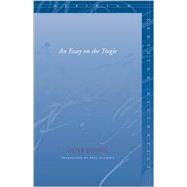Peter Szondis pathbreaking work is a succinct and elegant argument for distinguishing between a philosophy of the tragic and the poetics of tragedy espoused by Aristotle. The first of the books two parts consists of a series of commentaries on philosophical and aesthetic texts from twelve thinkers and poets between 1795 and 1915: Schelling, Holderlin, Hegel, Solger, Goethe, Schopenhauer, Vischer, Kierkegaard, Hebbel, Nietzsche, Simmel, and Scheler. The various definitions of tragedy are read not so much in terms of their specific philosophies, but rather in the way their views assist in analyzing tragedies with an aim to establish a general concept of the tragic. The second part presents exemplary analyses of eight tragedies: Sophocles'Oedipus Rex, CalderonsLife Is a Dream, ShakespearesOthello, GryphiusLeo Armenius, RacinesPhaedra, SchillersDemetrius, Kleist'sThe Schroffenstein Familyand Buchner'sDanton's Death. The readings neither presuppose a concept of the tragic determined by context (as in Hegel's idea of the conflict between two orders of right), nor do they focus exclusively on the texts explicit contents. Instead, they elaborate the dialectical or aporetic structures at the heart of the tragic. The works analyzed represent the four great epochs of tragic poetry: the age of Greek tragedy; the Baroque era in Spain, England, and Germany; French Classicism; and the age of Goethe.
Peter Szondi (1929-1971) was Professor of Comparative Literature at the Free University in Berlin. He is the author of groundbreaking works on the theory of drama, on literary hermeneutics, on Hölderlin, and on Celan.

